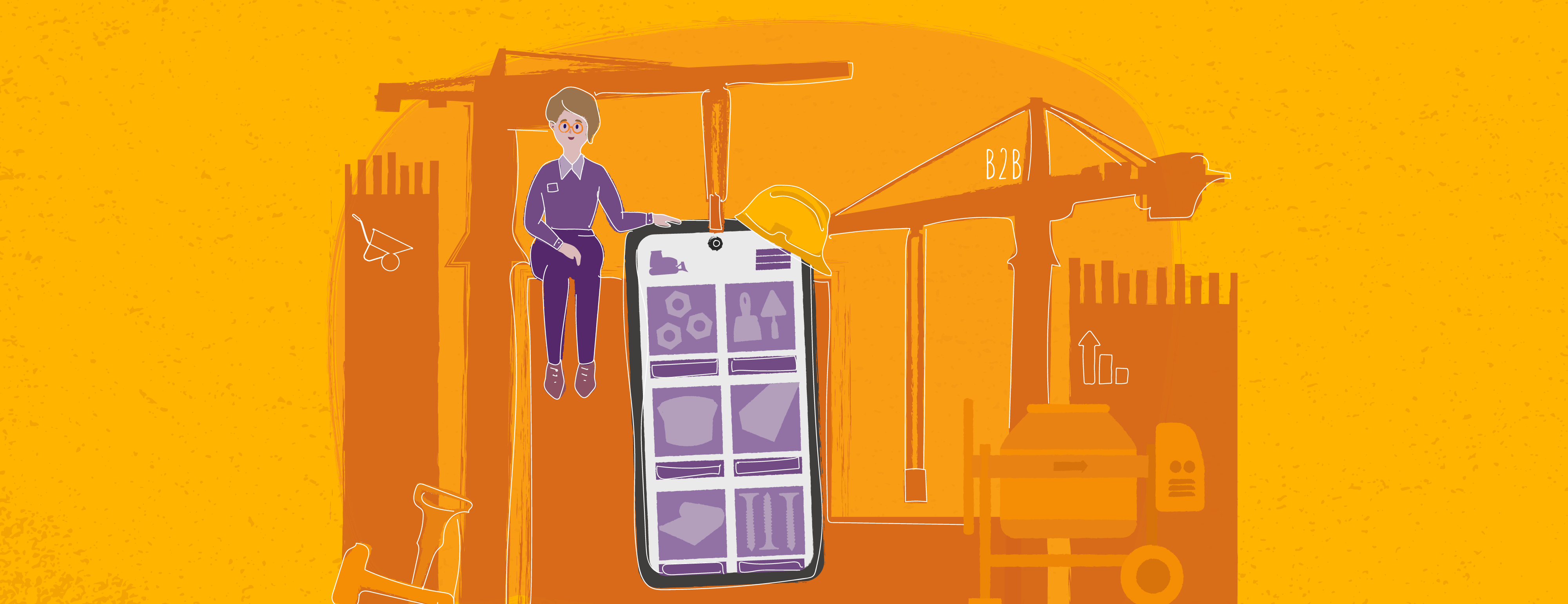E-commerce for Construction / Does It Make Any Sense?
When you think about e-commerce, perhaps, typically B2C market sectors come to your mind. But the truth is, with the generational shift happening right now, ubiquitous digitization, omnichannel approach, as well as the need to look for new sales channels, B2B moves to online trade, and the construction industry is no exception.
Earlier this year, Wunderman Thompson published The B2B Future Shopper Report 2023. It perfectly shows the growing importance of B2B in online trade:
- Currently, 49% of all B2B spending is online (predictions are it will be 57% in 5-years’ time)
- 68% of B2B buyers say that they will increase their use of digital shopping channels in the future
- 67% of B2B buyers start their purchase journeys online
Even if you don’t feel that the B2B online channel is 100% your future, this will be hard to avoid, considering the data. More than half of your clients at some point start their process online – just doing research or looking for the best prices. If they can’t discover your offer online, what is the likelihood that they will make a purchase?
Simultaneously, B2B buyers have to struggle with issues that the construction industry is currently experiencing as well, namely:
- Increased costs of raw materials: 24% of answers
- Increased costs of fuel and energy: 23%
- Product unavailability: 22%
- End customers buying fewer goods: 20%
- Geopolitical issues: 20%
Difficulties faced by the industry create the need to look for new markets, and target groups and go where your customers are. This also means investing in solutions that will help optimize costs in the long term, such as online e-commerce platforms.
Construction E-commerce: The Growing Trend
According to a different study, builders and other construction companies already see the potential of online trade:
Simultaneously, 60% of construction companies admit their industry is behind when it comes to adopting digital technology. And that’s true; the construction sector is not the first thing that springs to mind when thinking about digital transformation.
What Influences Digital Transformation in This Sector
There are two major questions to consider here. First off, construction companies are looking for ways to save money and streamline operations. Digital transformation of trade, including e-commerce, is the answer to both challenges.
Secondly, the report mentioned above states that over 40% of construction companies rank their supplier relationships among their top CX challenges. It is important to address these needs appropriately. The challenge is to move the direct relationship with the salesperson into the digital world.The B2B e-commerce platform, with its unique functionalities, will help support this process.
More and more B2B buyers expect construction companies to provide not only an online channel enabling seamless purchasing of construction materials, but also a substitute for the contact they know from the offline world. Our experience at Univio shows something similar.
B2B Customers Want to Buy Online: Pneumat Case Study
Pneumat is a Polish company providing tools and products for pneumatics. They’ve been operating in the Polish market since 1976. Recently, the company decided to digitize their operations. In 2019, they created the e-commerce department. Initially, Pneumat’s e-commerce channel was exclusively for the company’s regular customers. Today, it’s open to everyone. The results of moving sales to the online channel speak for themselves.
This case study (as well as many more out there) confirms that B2B buyers want access to online purchasing, and when it’s available – conversions, sales, and AOV go up.
Building Business Relationships Through B2B E-commerce Platforms
Some might argue that offering products online makes it difficult to build long-lasting relations with buyers, vendors, and contractors. However, our experience shows that in 2023, that’s not the deciding factor. People value seamless CX, broad offer, and flexible payment and delivery conditions. All of that can be provided via online construction commerce.
Naturally, this doesn’t mean that you should get rid of your offline channels and presence. The key to success lies in combining online and offline experiences so that your customers can pick the channel that checks all their boxes. That’s the very essence of the omnichannel model.
As Bartosz Pilch, Group Director of Omnichannel at SIG, puts it: “We build relationships both directly and online – always where it is the most convenient for the customer.”

A New Decision Factor – Generation X and Y
There is one more thing to consider. The B2B world is becoming filled with people representing Gens X and Y. These people are used to doing business online. For many of these people, the Internet and online trade is something natural. This means depriving them of access to online sales will hurt the relationship, not improve it. Considering the fact that generation X already makes up 31% of the total U.S. income – ignoring them may be not the best idea.
Optimized Work and Increasing Sales Efficiency: Euroterm Case Study
Euroterm is a company offering products for heating and sanitary purposes. The company’s main goal related to construction commerce was to optimize order processing and related processes. They wanted to streamline everyday work but also increase sales and customer satisfaction at the same time. Again, let the results this company has achieved tell the rest of this story:
As you can see, introducing online sales to Euroterm’s offer gave all the major sales metrics a significant boost. At the same time, since the sales process is now optimized, the sales team can devote more time to strengthening relations with the company’s most important customers and vendors.
Supporting the Omnichannel Model With a B2B Platform: Sig Case Study
SIG is a British company offering construction and building materials. They’ve been present in the Polish market for over 25 years now, and they have 50 brick-and-mortar stores across Poland. In 2016, they launched an e-commerce B2B platform SIG.pl. Thanks to the intuitiveness of this platform, as well as many solutions facilitating the purchasing process (e.g., product recommendation systems, system calculators and dedicated promotional actions), customers truly appreciate SIG’s offer, and the results this company achieves only confirm that:
Moreover, in 2022, SIG was awarded by the Polish Chamber of Electronic Economy the “Best in e-commerce B2B” 1st place award for its modern trading platform.
Wrapping Up: Does E-commerce in the Construction Industry Make Sense?
Close consideration of the market trends and the case studies we mentioned above leads to an apparent conclusion – yes, it does. Although the construction sector still has a lot of work to do, the e-commerce revolution has already started, and companies operating in this industry simply have to digitize their operations and introduce the omnichannel model (with online sales at the forefront) to their operations. Otherwise, they will soon be surpassed by more aware and innovative companies.
If you want to know more about e-commerce in the construction industry, we encourage you to download our free ebook: How Do B2B Platforms Expand Sales?








